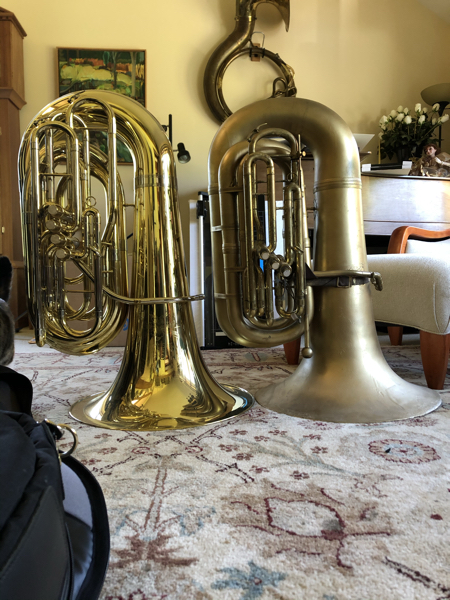Plastic tubas and sousaphones abound. The material in these is
radically different than brass. The stiffness, which directly affects resonance, is maybe 400,000 psi (for the stiffest versions of ABS), versus around 18,000,000 psi for brass (45 times greater). That means for a given stress, how much does the material deflect? With plastic, far, far more.
Sure, plastic is thicker, which closes that vast gap a bit. But if brass is 0.6 mm thick, then plastic of the stiffness above would need to be over an inch thick to regain in structural stiffness what it loses in material stiffness.
And the density of plastic is maybe as much as 75 pounds/cubic foot. Brass is more like 530 pounds/cubic foot, 7 times higher. If it’s thick enough to weigh two-thirds of the weight of a brass tuba, the structural stiffness of brass is still about an order of magnitude greater.
And then there is the impedance of the material at interesting frequencies. Plastic is, well, plastic rather than elastic, and suffers significant hysteresis losses when vibrated at higher frequencies. Tap it and it gives you a dull thud, because it is damping most musical frequencies. It has much higher impedance at musical frequencies, and a very low resonance. Brass is quite elastic at all musical frequencies, which is why it rings or at least gives you a metallic clang.
Yet, if I play my Martin and my Eastman, which are similarly shaped, any observer would insist that both are tubas, and pretty similar sounding tubas at that.

Sure, there are differences in sound and feel, but both have a characteristic tuba sound.
Now, let’s compare brass and silver. Against brass’s stiffness of about 18,000,000 psi, silver is about...17,000,000 psi. In fact, pure silver sits in the middle of the range of stiffness of the various brass alloys. And silver is only about 20% denser than brass. The entire silver plating of a tuba might weigh 4 ounces, if it’s well-plated, and compared to the same thickness of brass might add as much not quite an ounce.
I would argue that for a tuba made from brass with a thin coating of silver to sound even subtly different than one made from brass without the coating, a plastic tuba would have to sound as different as a tuba is from, say, a serpent. But it doesn’t.
The same does not hold for trumpets and trombones (or horns), which may be played with a characteristic sound that includes the ringing of the bell.
I am not saying that plastic tubas are identical by any means. I’m saying that when people discount gross effects when arguing about fine effects (especially effects so fine that experts can argue if they even exist), they are wasting their time. And players, like me, whose weaknesses are themselves gross effects (in both senses), spending even one life minute or one nickel pursuing these infinitesimally fine effects are chasing moonbeams and rainbows, and buying “improvement” with counterfeit money.
Yes, I have chased moonbeams and rainbows. But self-awareness is not self-control.
I would also argue that the differences between one instrument and the next to come off the line will be much closer to gross effects than the effects of the coatings. And that makes empirical comparisons of pairs of instruments without large (at least 10 of each) sampling and blind testing utterly unpersuasive to anyone with a background in materials science or testing.
Which I have.
Rick “summarizing vast time-wasting discussions from the past” Denney
